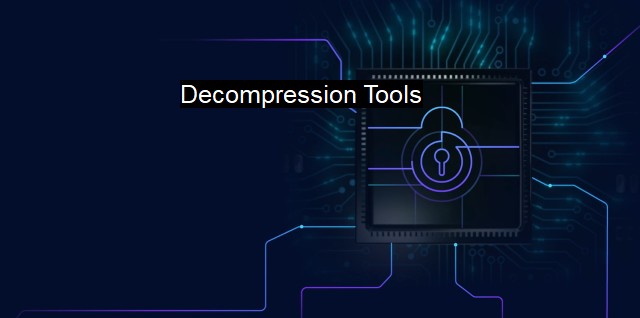What are Decompression Tools?
The Importance of Decompression Tools in Cybersecurity and Antivirus: Unveiling Malicious Code Hidden in Compressed Files
Decompression tools represent an essential part of the cybersecurity landscape and play a crucial role in antivirus processes. Significantly used for software distribution and delivery, digital downloads, and cloud storage solution, they are related to file compression—a computer function that reduces the file size for ease in managing, transferring, and storing.Decompression tools are exactly what their name suggests – they are software applications designed to "decompress" or unpack data that's been compressed into a smaller format. With the increase in technology usage, more data accumulation occurs each day, thus encouraging the need for compression to accommodate loads of information without too many complications. Once a file or a batch of files has been compressed, they often cannot be used until they have been decompressed.
Security vulnerabilities emerge when these tools are utilized without necessary precautions. Cybercriminals commonly use compressed files to distribute malicious programs. As specific decompression tools lack associated security patches, they can expose systems to malware when a compressed file is unpacked.
Decompression tools are often used by the antivirus software themselves to analyse compressed files on a system. These files represent "unknowns" that must be examined to ensure they do not harbor potential threats. When an antivirus solution encounters a compressed file (whether it's a ZIP, RAR, or any compressed format), it uses built-in decompression capabilities or tools to unpack the file and scrutinize its contents. It can then quarantine or eliminate any potential threats found within, ensuring the protection of the user's system.
It should be noted that the decompression process itself can present risks, mainly when individuals download and decompress files from unverified or dubious sources. Such untrusted sources can conceal viruses, worms, or other forms of malware within these compressed files. When a user decompresses these files, these harmful elements can infect the system. Therefore, users must be vigilant when obtaining compressed files and contrastingly, when decompressing them.
This is where antivirus and cybersecurity solutions make their mark. They scan compressed files for potential security threats before the user undertook the decompression process. Some antivirus software now provides real-time scanning during downloading or before the file decompression process starts, furnishing maximal security against threats that cybercriminals might try to sneak in through compressed files.
One important benefit of decompression procedures in cybersecurity is that it aids malware forensic analysis. Cybersecurity professionals often analyze decompressed or "unpacked" forms of malware to understand their structure, behavior, and intentions. Isolating malware in realized, decompressed states aids in developing more effective antivirus patches and boost malware detection rates, leading to more reliable and robust system protection.
Still, while being an important tool, decompression should not be viewed as the ultimate solution to cyber threats but as part of a composite cybersecurity strategy. It needs to be combined with a regular antivirus scan, firewall, intrusion prevention system, and user education about secure online behavior.
Decompression tools, while helpful in managing data storage and transfer, come with inherent security risks that need to be appropriately managed. Antivirus and cybersecurity implementations often utilize these tools in their operations to unpack compressed information for a thorough analysis of potential threats. Concurrently, these tools can aid cybersecurity efforts by furnishing greater insights into the complex world of malware and threat actors, helping to develop more effective protection measures. But the users and organizations must not forget the importance of following best cybersecurity practices to minimize the risk associated with the use of decompression tools.

Decompression Tools FAQs
What are decompression tools?
Decompression tools are software tools that are used to unpack compressed files such as zip, rar, and gzip archives. These files are commonly used to transfer large amounts of data securely and quickly. In cybersecurity and antivirus, decompression tools are useful in analyzing and detecting potential malware or viruses that may be hiding within compressed files.Are decompression tools safe to use?
Yes, decompression tools are generally safe to use. However, caution should be exercised when downloading and using decompression tools from third-party websites. Always download decompression tools from reputable sources such as the official website of the software provider. Additionally, it is important to have antivirus software installed that can detect any potential malicious files within compressed archives.What are some popular decompression tools used in cybersecurity and antivirus?
Some popular decompression tools used in cybersecurity and antivirus include WinZip, WinRAR, 7-Zip, and PeaZip. These tools are widely used and trusted by cybersecurity professionals around the world. Additionally, many of these tools offer advanced features such as encryption and password protection to secure sensitive data within compressed archives.Can decompression tools be used to recover deleted or corrupted files?
No, decompression tools cannot be used to recover deleted or corrupted files. Decompression tools are designed to unpack compressed files, not to recover lost or damaged files. However, there are other software tools available specifically for data recovery that may be useful in such situations.| | A | | | B | | | C | | | D | | | E | | | F | | | G | | | H | | | I | | | J | | | K | | | L | | | M | |
| | N | | | O | | | P | | | Q | | | R | | | S | | | T | | | U | | | V | | | W | | | X | | | Y | | | Z | |
| | 1 | | | 2 | | | 3 | | | 4 | | | 7 | | | 8 | | |||||||